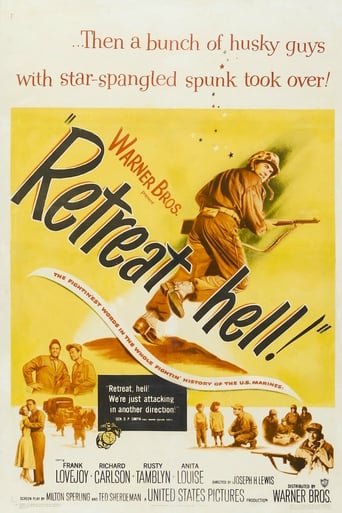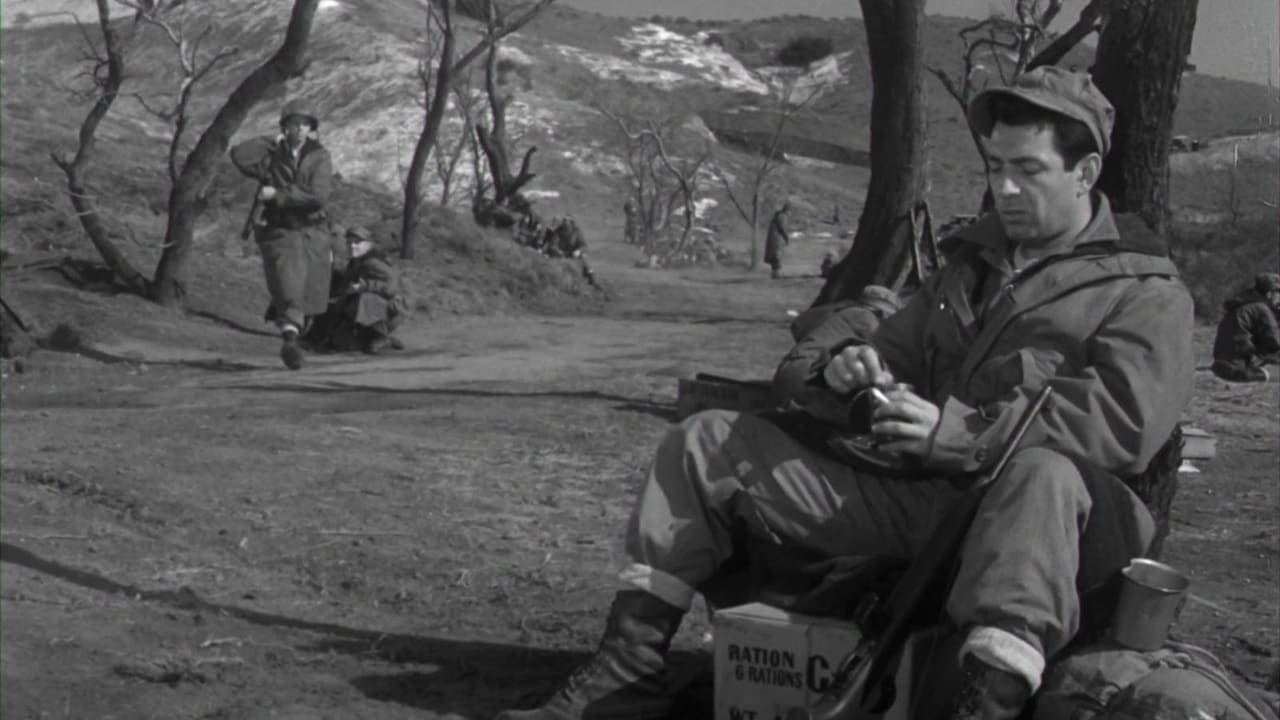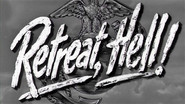gordonl56
RETREAT, HELL! - 1952 This film, one of several that more or less, tell the same story about the U.S. Forces retreat from the Chosin Reservoir in North Korea.The film starts in the States with ex-Marine officer, Richard Carlson being called back to active service. Carlson is not all that happy with the recall but reports. His commanding officer is hard as nails, Frank Lovejoy. It is the job of the few World War Two veterans to train the fresh recruits and whip them into combat ready soldiers.Training is somewhat rushed because of the desperate situation going on in South Korea. The Reds have overrun most of the country and pushed the few surviving forces into a pocket on the southern end of the country.U.S. Forces launch a counterattack by landing at Inchon and flanking the North Korean Army. The Reds soon cave and the chase is on all the way up the peninsula. Just as it looks like the war might end, the Chinese Red Army comes boiling over the border from China. This catches the U.N. forces by surprise forcing, shall we say, a rather retrograde manoeuvre.The film follows Lovejoy's Marine battalion from training, through the Inchon landing, up through the North, and as they make their way back south.The Marines are badly outnumbered, low on ammo and poorly supplied with winter equipment. The Chinese Reds throw massive human wave attacks at the unit. This causes a dangerous run on medical supplies, and further depletes the already low ammunition reserves.It is only the odd air supply mission and constant air support that gives the Marines a chance to make their way to safety. Soon their trucks are out of fuel and they are forced to carry their growing collection of wounded. The Marines work their way through several more Red attacks and ambushes. Lovejoy gets wounded and Carlson must take command.They are joined along the way by various other retreating units, including some British Royal Marines. Needless to say they manage to make it safely to the coast and are evacuated by sea.The film, like, Alan Dwan's HOLD BACK THE NIGHT, Sam Fuller's THE STEEL HELMET, FIXED BAYONETS and Anthony Mann's MEN AT WAR all deal with this same retreat. This Joseph H. Lewis directed work is quite watchable, by not quite as good as these others. Alan Dwan directed the superb WW2 Marine film, SANDS OF IWO JIMA.The acting is fine, and the look of the film is quite good with ex special effects man, Warren Lynch at the cinematography controls. The film's director, Joseph Lewis is best known for several cracker-jack film noir such as, SO DARK THE NIGHT, MY NAME IS JULIA ROSS, THE BIG COMBO and of course, GUN CRAZY.
dougdoepke
The movie traces Marine combat battalion from training base in California to South Korea's Inchon landing to North Korea's Chosin Reservoir and retreat from there to the coast for naval rescue.Several notable features are in this otherwise fairly routine war film. First, it's surprisingly de-politicized for its sensitive time period. The movie was produced in 1952, at a time when the war in Korea had stalemated and anti-communist fervor (Senator McCarthy) was at a fever pitch stateside. One would expect a lot of talk about red aggression and Chinese hordes. However, there's hardly any explanation in the narrative about where the war is or why it's occurring! Instead, the screenplay focuses almost exclusively on Marine Corps professionalism from officers to NCO's to recruits. Looks to me like the movie's purpose is to restore the Marines' popular image following the Chosin debacle, without getting involved in messy politics. After all, Marine combat in WWII had been one of steady advance across the Pacific; at the same time, footage of retreat in Korea shook American confidence in that murky war.Another notable feature is the low-budget film's effort at recreating the horrendous winter weather that plagued the retreat. I recall newsreels of the time of the steep mountains and freezing snow being almost as scary as the combat itself. I doubt the retreat over those mountain passes would have succeeded without the continuous air support.Notable too is the general absence of sometimes silly small talk that characterizes so many WWII combat films. That's understandable since the war in Korea was never popular and little understood at home, especially after the massive Chinese intervention. On the other hand, there's the kind camaraderie and bonding among the troops that could be expected, but none of the light-hearted victory-is-certain banter of 10-years earlier.As other reviewers note, the combat itself is mostly a series of clichés. However, the acting is good and Tamblyn is perfect for his idealized all-American-boy role. But the movie itself is now largely a curiosity dramatizing as it does one of America's few military retreats.(In passing—in my little book, the war was characterized by two massive blunders—first, North Korea's reckless belief that the US would tolerate a unified communist Korea only a few hundred miles from post-war Japan; and second, Gen. MacArthur's over-confident belief that China would somehow allow an American army on China's border {the Yalu river}. The result of these blunders was 3-years of war, thousands of dead, and most ironically, a return afterward to the same divided country {38th Parallel} as before the devastation!)
Robert J. Maxwell
It's surprising that there isn't a decent DVD available for "Retreat, Hell!" It's a good example of the kind of war movie that was produced during World War II and a few of the post-war years, before the war was reexamined and faced more realistically.It has elements of all the generic conventions. Frank Lovejoy is the Marine colonel who has to whip his battalion of raw recruits (is there any other kind?) and retreads into shape. His tactic for achieving this is to morph into Frank Lockjaw. Only towards the end does he begin to show his more sensitive side. Yes, on the surface he may be crusty and hard-hearted. But underneath that, he's a real softy. It's a good thing they didn't dig any deeper into his character or they might have found another layer in which he was a real MEAN SOB.Richard Carlson is the retread from World War II, a reservist pulled back into active duty as a company commander. He's forced to move his wife and two lovely kiddies into a Quonset hut and he's deprived of their company, despite his whining to Lockjaw. He toughens up though and learns to be a Marine first.There is the kid, Russ Tamblyn, who at this stage of his career could not yet act, who must prove himself as much a Marine as the rest of the men in his family. (He looks about fourteen.) One of his brothers is an officer serving near Tamblyn's unit and we know at once, when Tamblyn asks for permission to visit after a battle, that the brother is KIA.Then there is the somewhat slow, drawlin' Southrin boy who provides a bit of comic relief, though not much. And the Gunnery Sergeant who must harden his men for battle.The usual conventions are followed. There is the mail call ritual, the fierce climactic speech about how we'll fight on and reach our goal, outnumbered and surrounded though we may be. The final entrance of the troops and equipment into Allied lines. And when some bystanders ask this ragged group what outfit they belong to, Frank Lovejoy (now thoroughly humanized) straightens up and replies proudly, "First battalion, United States Marines." It really does hark back to World War II movies. The enemy are faceless. The rifle shots don't sound like rifle shots at all. A fired weapon emits a modest ka-Whoosh instead of a loud pop. There is the tension of waiting while the enemy approach like black cockroaches over the snowy hills and our troops are out of ammunition until, at the last moment, the skies clear and cargo planes make the necessary drop, just as in "Battleground", a superior example of the genre.Some of the engagements are shot in the hills around Hollywood, but there is some combat footage from Korea inserted too. The actual events have been cleaned up a bit for public consumption. The reason the Marines and the Army had been caught with their pants down is that they had sailed northward through the British lines as if on a picnic. MacArthur had found little resistance in North Korea and was determined to thrust quickly through to the Manchurian border, while the more prudent British adopted a cautious advance on a broad front. MacArthur had assured President Truman that there was no chance of Chinese intervention, a big misjudgment. MacArthur had also declared the men would be home by Christmas which didn't happen and this is mentioned by one or two characters in the film, but sadly, without bitterness. The retreat from the reservoir was genuine hell. The weather was bitterly cold and frostbite was common. The Chinese troops had more protective clothing than ours. And omitted from this movie are newsreel scenes of frozen bodies being dragged on sleds behind trucks during this slow, sixty-mile retreat.I'd give this movie bonus points for having taken a chance on its being about a retreat instead of a victory. We don't hear much about Korea these days. It ended in a stalemate. Retreats, defeats, and stalemates are the stuff neither of legends or commercially successful movies. They don't follow the accepted scenario in which we either win or put up a gallant fight before being wiped out by a treacherous foe. "A Bridge Too Far" was another risky production. I doubt that this one would have been made in quite the way it was except for a proclamation by one Marine officer who, when asked if they were retreating, said, "Retreat, Hell. We're just advancing in a different direction." A ringing line like that is enough to transform our perception of what we are witnessing on the screen.
RanchoTuVu
The Korean War doesn't have the glory that goes with WW2, although there are a few films about that war that have helped shape an image of bitter fighting carried out in even more bitter weather conditions. Retreat, Hell! should be right up there with Pork Chop Hill as the definitive Hollywood depiction of that conflict. It has that deft mix of grim authenticity, of action, and of fine characterizations. It has to be one of Russ Tamblyn's best dramatic parts. A lot of well interspersed and well done action scenes of fighting in barren snow swept hilltops and ravines, with the finale being a furious Chinese charge right into the colonel's tent. In black and white, this film has a pervasive grimness to it, that contrasts with the story of a unit of Marines trying to keep up a sunny and positive spin on a desperate situation. It's a flag-waver, but exceedingly well done.


 AD
AD



